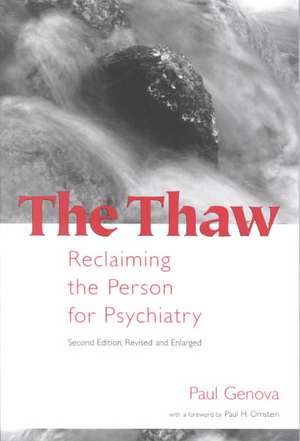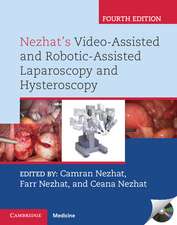The Thaw: Reclaiming the Person for Psychiatry
Autor Paul Genovaen Limba Engleză Paperback – sep 2002
Whether he is reflecting critically on the therapeutic claims of the latest treatment modalities, grappling with the meaning of boundary violations, paying homage to the transformative potential of suffering, or recounting episodes from his own personal and professional odyssey, Genova is a luminous guide, elegant and down to earth, unfailingly thoughtful and thought-provoking, to the trials, tribulations, and healing promise of day-to-day psychotherapeutic work. With vivid immediacy, The Thaw celebrates the renascent healing potential of a contemporary, person-centered psychiatry that is analytically, neuroscientifically, and politically informed. All mental health professionals and many interested lay readers will find much here to illumine their daily struggles.
| Toate formatele și edițiile | Preț | Express |
|---|---|---|
| Paperback (1) | 227.87 lei 6-8 săpt. | |
| Taylor & Francis – sep 2002 | 227.87 lei 6-8 săpt. | |
| Hardback (1) | 988.66 lei 6-8 săpt. | |
| Taylor & Francis – 18 dec 2017 | 988.66 lei 6-8 săpt. |
Preț: 227.87 lei
Preț vechi: 322.98 lei
-29% Nou
Puncte Express: 342
Preț estimativ în valută:
43.61€ • 45.27$ • 36.36£
43.61€ • 45.27$ • 36.36£
Carte tipărită la comandă
Livrare economică 25 martie-08 aprilie
Preluare comenzi: 021 569.72.76
Specificații
ISBN-13: 9780881633801
ISBN-10: 0881633801
Pagini: 210
Dimensiuni: 152 x 229 x 12 mm
Greutate: 0.39 kg
Ediția:Revised and Exp
Editura: Taylor & Francis
Colecția Routledge
Locul publicării:Oxford, United Kingdom
ISBN-10: 0881633801
Pagini: 210
Dimensiuni: 152 x 229 x 12 mm
Greutate: 0.39 kg
Ediția:Revised and Exp
Editura: Taylor & Francis
Colecția Routledge
Locul publicării:Oxford, United Kingdom
Public țintă
Professional and Professional Practice & DevelopmentCuprins
Part I: Seven Visitations. Introduction to Part I. Dream Rebuts Therapist. Catfish on the Bottom. The Permanent Trip. Lacan at Bonus Bagels. Living with Doubt. "I'm Not Your Urban Renewal Project." The New Covenant. Part II: Supervision and Self-Disclosure. Introduction to Part II. The Thaw. Here Are the Scales. Snow White. Raffaela's Hug. "I Just Keep Playing the Same Note". Getting Two (2.0) People into the Room. The Endless Walk of the Fool. Rockabye Baby: Winnicott's Hatred. Our Trainees' Calling, Our Job Description. Part III: The Psychiatric Persuasion. Introduction to Part III. Why I Love Lewiston. Take Care of Him. God or Vending Machine? Requiem for Psychoanalysis. The Shifting Metaphors of Biological Psychiatry. The Coming Polarization fo Psychotherapy. Psychiatric Wisdom. Getting Macie off the Mountain. Part IV. Still Carving, Day and Night. Introduction to Part IV. Is American Psychistry Permanently Ill? Boundary Violations and the Fall from Eden. There Are Really Only Three Kinds of Psychotherapy. Rabbi Among the Mechanics. What Does Suffering Do? Psychotherapy after Mohammed Atta. The Domestication of the Truth. The Owl Stick.
Recenzii
"In this era of managed care and the latest DSM as Bible, and the emphasis on quick and measurable symptom relief by appropriate medication and short manualized psychotherapies, one welcomes an experiences clinician's insistence on the persistent benefits of open-ended psychotherapy...Being in the trenches with such a colleague makes this reading enjoyable."
- Kathleen M. Mogul, M.D., American Journal of Psychiatry
"Genova's book...helps the reader locate the deep well of humane values underlying our profession...[He] aims at extracting the best essence from both psychodynamic and biological approaches and using them pragmatically and judiciously to help the patient...The Thaw reveals a clinician whose goal is always to free the frozen psyche, allowing it to rejoin the larger, warmer world."
- Ron Pies, M.D., Psychiatric Times
"[Genova] gives us insight, creativity, intuition balanced with erudition, and all wrapped in a parchment of caring...The Thaw is well worth your time and attention, and that of anyone with an interest in pragmatic and compassionate psychotherapy. One final reward consists of the sheer pleasure of being guided through complex and meaningful issues by a mind that examines them with such clarity and humanity."
- Stephen Howard, M.D., JAAP
"The Thaw brings to mind Holden Caufield's observation that sometimes when you finish a book you with the author were a friend of yours, so you could spend more time with him. Genova's writing is insightful and self-effacing. He's an intellectual, but not a pedant, and he's got a nice, cerebral sense of humor...[H]e's willing to talk about experiences that therapists don't address in the books that they hope will get them on Oprah."
- Jim Naughton, Ph.D., Psychotherapy Networker
"In this well-written and timely book, a series of essays by the author is collected in which he passionately argues for the reclaiming of the individual, the person, from the orientation of biological psychiatry, which is viewed as being more interested in neurotransmitters and their physiological effects. Genova is to be commended for trying to reconsider the individual, the person, in psychiatry and psychotherapy, taking great pains to emphasize how important it is for psychotherapists not to lost track of the actual lives, rather than biology, that are there to be treated."
- Herbert Bennett, Psy.D., in Psychotherapy Review, 18.1, 2006
- Kathleen M. Mogul, M.D., American Journal of Psychiatry
"Genova's book...helps the reader locate the deep well of humane values underlying our profession...[He] aims at extracting the best essence from both psychodynamic and biological approaches and using them pragmatically and judiciously to help the patient...The Thaw reveals a clinician whose goal is always to free the frozen psyche, allowing it to rejoin the larger, warmer world."
- Ron Pies, M.D., Psychiatric Times
"[Genova] gives us insight, creativity, intuition balanced with erudition, and all wrapped in a parchment of caring...The Thaw is well worth your time and attention, and that of anyone with an interest in pragmatic and compassionate psychotherapy. One final reward consists of the sheer pleasure of being guided through complex and meaningful issues by a mind that examines them with such clarity and humanity."
- Stephen Howard, M.D., JAAP
"The Thaw brings to mind Holden Caufield's observation that sometimes when you finish a book you with the author were a friend of yours, so you could spend more time with him. Genova's writing is insightful and self-effacing. He's an intellectual, but not a pedant, and he's got a nice, cerebral sense of humor...[H]e's willing to talk about experiences that therapists don't address in the books that they hope will get them on Oprah."
- Jim Naughton, Ph.D., Psychotherapy Networker
"In this well-written and timely book, a series of essays by the author is collected in which he passionately argues for the reclaiming of the individual, the person, from the orientation of biological psychiatry, which is viewed as being more interested in neurotransmitters and their physiological effects. Genova is to be commended for trying to reconsider the individual, the person, in psychiatry and psychotherapy, taking great pains to emphasize how important it is for psychotherapists not to lost track of the actual lives, rather than biology, that are there to be treated."
- Herbert Bennett, Psy.D., in Psychotherapy Review, 18.1, 2006
Notă biografică
Paul Genova, M.D., is a graduate of Harvard College and Dartmouth Medical School. He briefly practiced general medicine in East Kentucky before returning to Portland, ME for psychiatric training. There he has practiced general psychiatry and psychotherapy since 1982, both in private practice and in a variety of public settings. A Clinical Associate Professor of Psychiatry at the University of Vermont College of Medicine, Dr. Genova writes a well-known column for his profession's most widely circulated publication, Psychiatric Times and is a Contributing Editor of Voices: Journal of the American Academy of Psychotherapists.
Descriere
Whether he is reflecting critically on the therapeutic claims of the latest treatment modalities, grappling with the meaning of boundary violations, paying homage to the transformative potential of suffering, or recounting episodes from his own personal







